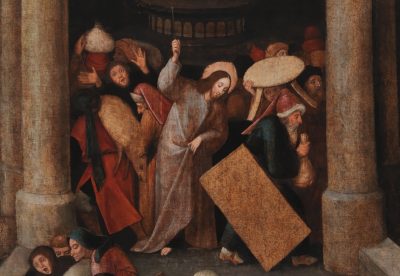 Readings:
Readings:
Exodus 20:1–17
Psalm 19:8–11
1 Corinthians 1:22–25
John 2:13–25
Jesus does not come to destroy the temple, but to fulfill it (see Matthew 5:17)—to reveal its true purpose in God’s saving plan.
He is the Lord the prophets said would come—to purify the temple, banish the merchants, and make it a house of prayer for all peoples (see Zechariah 14:21; Malachi 3:1–5; Isaiah 56:7).
The God who made the heavens and the earth, who brought Israel out of slavery, does not dwell in sanctuaries made by human hands (see Acts 7:48; 2 Samuel 7:5).
Nor does He need offerings of oxen, sheep, or doves (see Psalm 50:7–13).
Notice in today’s First Reading that God did not originally command animal sacrifices—only that Israel heed His commandments (see Jeremiah 7:21–23; Amos 5:25).
His law was a gift of divine wisdom, as we sing in today’s Psalm. It was a law of love (see Matthew 22:36–40), perfectly expressed in Christ’s self-offering on the Cross (see John 15:13).
This is the “sign” Jesus offers in the Gospel today—the sign that caused Jewish leaders to stumble, as Paul tells us in the Epistle.
Jesus’ body—destroyed on the Cross and raised up three days later—is the new and true sanctuary. From the temple of His body, rivers of living water flow, the Spirit of grace that makes each of us a temple (see 1 Corinthians 3:16) and together builds us into a dwelling place of God (see Ephesians 2:22).
In the Eucharist we participate in His offering of His body and blood. This is the worship in Spirit and in truth that the Father desires (see John 4:23–24).
We are to offer praise as our sacrifice (see Psalm 50:14, 23). This means imitating Christ—offering our bodies—all our intentions and actions in every circumstance, for the love of God and the love of others (see Hebrews 10:5–7; Romans 12:1; 1 Peter 2:5).














